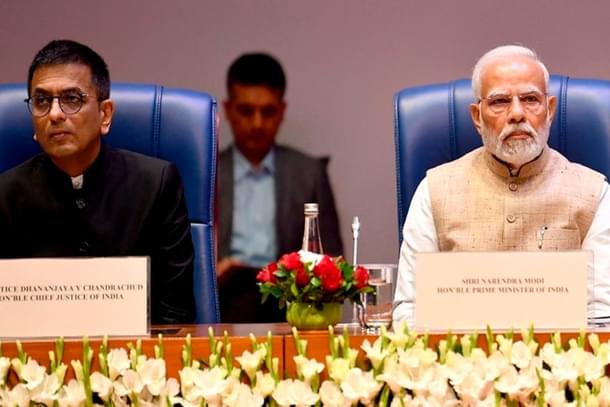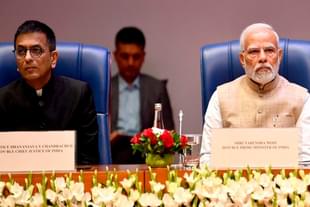News Brief
Amid Criticism From MVA Leaders, Former CJI Chandrachud Defends SC’s Independence
Arjun Brij
Nov 27, 2024, 02:11 PM | Updated 02:11 PM IST
Save & read from anywhere!
Bookmark stories for easy access on any device or the Swarajya app.


Firmly defended the independence of the Supreme Court, former Chief Justice of India (CJI) D.Y. Chandrachud in the ANI Interview stating that no single party or individual can dictate which cases the court should prioritize. His comments came in response to remarks by Shiv Sena (UBT) leader Sanjay Raut, who blamed the former CJI for the Maha Vikas Aghadi’s (MVA) defeat in the Maharashtra Assembly elections.
Raut alleged that Justice Chandrachud’s failure to rule on petitions concerning the disqualification of MLAs facilitated political defections, which contributed to the MVA’s poor performance. The MVA, an alliance of the Shiv Sena (UBT), Congress, and the Sharad Pawar-led NCP, managed to secure only 49 of the 288 seats in the state Assembly elections.
Addressing these criticisms in an exclusive interview with ANI, Chandrachud said, “Should any one party or individual decide what cases the Supreme Court should hear? Sorry, that choice is for the Chief Justice.” He emphasized that during his tenure, the court focused on critical constitutional matters, including rulings by nine-judge, seven-judge, and five-judge benches.
The former CJI highlighted the court’s efforts to resolve longstanding constitutional cases, some of which had been pending for over two decades. He explained the challenge of balancing limited judicial resources while addressing both older and newer cases.
“If we take up old cases, we are criticized for not addressing recent ones. With limited manpower and a set number of judges, we need to strike a balance,” he said. Chandrachud also pointed out that during his tenure, the court decided 38 Constitution Bench cases, including significant matters such as electoral bonds, the Uttar Pradesh Madrasa Act, and the Aligarh Muslim University case.
“Are these cases any less significant than a particular case we couldn’t decide? Important constitutional cases cannot be ignored simply to meet the demands of a specific segment,” he added.
Chandrachud criticized the tendency of some political groups to measure judicial independence based on whether the court aligns with their agenda. “The real problem is that a segment of the polity believes the judiciary is independent only if it follows their agenda,” he remarked.
He also accused “highly resourced individuals” of attempting to influence the court’s priorities during his tenure. “Sometimes, well-resourced persons come to the court expecting us to take up their cases immediately. But the court cannot and will not be dictated to by any third party,” he stated firmly.
Raut had suggested that the judiciary’s inaction on MLA disqualification petitions eroded the fear of law among politicians, enabling political defections that ultimately weakened the MVA alliance. Chandrachud rejected this notion, stating that the court remains committed to its constitutional mandate and cannot cater to individual or political demands.
“If you want to accuse us of not working even a minute of the time we are assigned, that criticism would be valid. But beyond that, it’s unacceptable to claim the judiciary is not independent just because we didn’t decide a specific case,” he said.
Arjun Brij is an Editorial Associate at Swarajya. He tweets at @arjun_brij





